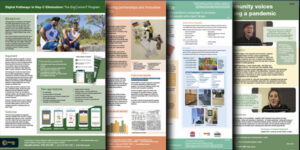The Champion #97 – June 2021
This issue:
- Mandatory Disease Testing Bill passed into law
- Viral Hepatitis 2021 Conference
- Accord 2030: Eliminating viral hepatitis in Australia
- Liver cancer prevention taught at health event for Korean women
- National Volunteer Week 2021 – Recognise, Reconnect & Reimagine

Mandatory Disease Testing Bill passed into law

Disappointingly, the Mandatory Disease Testing Bill 2020 was approved by the NSW Parliament, after a final vote by the Legislative Assembly, on June 8. The Act came into effect on June 17, 2021.
The Liberal/National Coalition and Labor supported the Bill, as expected. Champion MPs who had advocated alongside the community for public health evidence – particularly Alex Greenwich and Jenny Leong – saw many of their amendments defeated. The only additional amendment passed allows the Ombudsman to collect demographic information to assist with their monitoring role.
Mandatory disease testing has now become a reality in NSW – as it already has in other Australian jurisdictions – despite extensive evidence provided by community organisations, public health, medical and legal experts that the Bill is unnecessary, contrary to public health objectives and will perpetuates misconceptions about hep C, hep B, HIV, and blood-borne viruses.
The Bill:
- gives NSW authorities unprecedented powers to force people to get a blood test – without patient consent – in circumstances where the person’s bodily fluid contacts a health, emergency, or public sector worker because of the person’s deliberate action and the worker may be at risk of contracting a blood-borne disease. Typically, this would include circumstances where a police officer is assaulted and the person’s blood comes into contact with that police officer.
- allows “Senior Officers” with no public health experience or knowledge of hep B or hep C or HIV to decide if a mandatory testing order should go ahead or not. The Bill does not sufficiently rely on medical and public health advice; Senior Officers are to consider guidelines from the NSW Chief Health Officer but our understanding is that they are not bound by such guidelines.
- may result in testing in situations where there is no risk of hep B or hep C or HIV transmission, such as spitting. The definition of bodily fluids is broad and includes saliva, which carries zero risk of blood borne virus transmission.
- authorises police to transport people to testing sites and the use of reasonable force. This will undermine public health efforts and, in addition to being contrary to nurses’ ethical professional duties towards patients, conducting testing on people who have not consented may place them in danger.
- applies to teenagers from the age of 14.
- contains weak appeals processes, oversight and accountability mechanisms. People subject to a mandatory disease testing order can ask for a review by the Chief Health Officer but the mandatory testing order continues to have effect – the person will have to get tested anyway, the review only affects the release of the results. Mandatory Disease Testing orders are to be reported to the NSW Ombudsman who will publish a report on the scheme in a year’s time but the Omdurman’s role is limited to a monitoring.
For more information, see the community case against mandatory testing and submissions provided to a Parliamentary inquiry (21 organisations opposed the Bill, while only four supported it).
While we have managed to delay this for years since the Police Association first proposed the scheme, it is a huge disappointment that community efforts to advocate for public health, publicly and behind the scenes, have not prevailed.
Advocacy continues through trying to influence some of the guidelines and oversight mechanisms related to the scheme. ACON and ASHM have written to the Chief Health Officer to offer assistance in developing the guidelines for the scheme, and HALC and ACON have also written to the Ombudsman to point out some of the key things that we think should be considered as part of their oversight role. Hepatitis NSW, along with our partners will have an important role to play to monitor the scheme, which will be formally reviewed in a year’s time. Separately, at a national level, there are efforts underway to update and improve guidelines for police regarding blood-borne viruses.
Viral Hepatitis 2021 Conference

Earlier this month, ASHM held a very successful hybrid viral hepatitis conference across two cities and online. A range of issues around stigma and discrimination, increasing the uptake of treatment and cure in marginalised communities, and much more were covered over three days.
Hepatitis NSW staff attended and had four posters accepted for the digital component. We highlighted several of our successful community focused programs and projects from 2020. For anyone who didn’t get an opportunity to check them out (attendees and non-attendees alike), you can view and download these posters below.
- Digital Pathways to Hep C Elimination: The HepConnect Program
Our Hep Connect program – using the Perx health app – supports people living with hep C, from testing, through treatment all the way to cure. This poster outlines the success of the program, and the positive uptake of the app by many Local Health Districts across New South Wales. >>>VIEW - Postcards from prison: creating partnerships and innovative health promotion during COVID
This poster outlines the development and success of our health promotion hep C initiative for people in prison. A total of 10,000 packs containing hep C info, postcards with mindfulness colouring-in images and health promotion messages, colouring pencils, Tx! MAGs and a pencil case/document folder were distributed through 36 prisons via Corrective Services programs. >>>VIEW - Clearing The Path: A partnership to deliver a communications campaign to increase hepatitis C treatment access for people who inject drugs
The hugely successful Clearing the Path communications campaign was rolled out state-wide in 2020. This poster, outlines development, implementation and outcomes of this project which laid the groundwork for increased hep C direct-acting antiviral treatment access by people who inject drugs >>>VIEW - Ensuring community voices are heard during a pandemic
With COVID-19 causing the cancellation of clinical and community face-to-face training and events, our Speaker Service peers were missing out on opportunities to tell their stories about living with, and treating, viral hepatitis. This poster looked at how we used new media and technology to ensure their voices would continue to be heard. >>>VIEW
Accord 2030: Eliminating viral hepatitis in Australia

“The elimination of hepatitis B and hepatitis C by 2030 can be Australia’s next major preventive and public health success.”
This is the message of The 2030 Accord, a new campaign by Hepatitis Australia which has broad community, clinical and academic support. The campaign aims to increase awareness and momentum in the Australian community to achieve hep B and hep C (viral hepatitis) elimination by the end of this decade.
Australia is already leading the world in viral hepatitis elimination. We have strong national strategies with clear targets. We have the medicines and a vaccine and can achieve the elimination of viral hepatitis. Of the 188,950+ people living with hep C in 2016, more than 40% have already been cured. The coverage for hep B immunisation in 12-month old babies now exceeds 95% in Australia. However, both hep B and hep C must be a national health priority to achieve elimination by 2030.
The 2030 Accord’s mission is to ensure viral hepatitis elimination is an Australian national health priority in policy, investment, and action. To lead the collaborative efforts needed, there are six actions that the Australian Government can take by the end of 2022.
- Ensure Australia achieves its 2022 national hepatitis C treatment target.
- Ensure Australia achieves its 2022 national hepatitis B targets.
- Continue to act as a global and regional leader in viral hepatitis elimination.
- Ensure Australia maintains a clear viral hepatitis national policy direction consistent with its
global elimination commitment. - Keep Australia at the forefront of lifesaving research.
- Ensure Australia’s health system has the capacity to prevent, prepare and respond to
communicable diseases, including viral hepatitis.
- Read more detail on The 2030 ACCORD>>> CLICK HERE
- Visit The 2030 Accord website>>> CLICK HERE
Liver cancer prevention taught at health event for Korean women

Hepatitis NSW participated in a Cancer Prevention seminar for Korean women, held during May at Lidcombe’s Dooleys Club. This was a long awaited, post-COVID face-to-face event.
Funded by Cancer Council in Western Sydney, the event also brought in other Korean organisations including Australian Korean Welfare Association, CASS, Korean Nurses Association in Australia, Korean Assist, and Kowin. It was truly an event for Korean women in name and substance!
The theme of cancer prevention for women covered hepatitis B and liver cancer prevention, cervical cancer screening, and breast cancer screening. Mina Kim from Hepatitis NSW, and the nurses from NSW Cancer Council, presented. The Storr Liver Centre of Western Sydney Local Health District (WSLHD) hep B team came to conduct blood screening to 25 people and overall, it was a successful event with 70+ participants and 20 staff members.
There were also performances from the drummers of the Arango Janggu team and the Good Friends Women’s Choir. A child minding service ensured young mums could come and listen to the useful health info.
National Volunteer Week 2021 – Recognise, Reconnect & Reimagine

For many of us, or the people we know, are still in recovery from drought, devastating bushfires, and floods while in the midst of a global pandemic that has changed the way we live and work. During this time, volunteers from across Australia have been contributing to this recovery by supporting organisations to continue to provide services and resources to their communities.
This continuing support by volunteers to organisations includes the support given to Hepatitis NSW. For a period in 2020 we were unable to invite volunteers into our offices, however, when we again started to put out calls for assistance, volunteers responded. Contributing over 300 hours in recent months volunteers have helped support the well-being of people with viral hepatitis.
To thank volunteers and recognise their contribution to Hepatitis NSW we celebrated National Volunteer Week 2021 at Abduls Restaurant in Surry Hills with lunch, a distribution of gift vouchers and certificates to all volunteers attending.
Deputy CEO Maria McMahon was in attendance on behalf of CEO Steven Drew, and Satyajit Patra – who has been the Volunteer Representative for much of the last three years – was there to represent the Hepatitis NSW Board of Governance. The event, whether volunteers could attend or not, was to recognise and thank them for their contributions in achieving the goals of the Hepatitis NSW over the years.
With the theme of National Volunteer Week this year being “Recognise, Reconnect & Reimagine”, we hope we can continue to offer volunteering opportunities throughout 2021 – reconnecting with our wonderful volunteers and for them to reconnect to us, and with other volunteers here at Hepatitis NSW.
We will be sending out a survey later this year asking volunteers how we can better, or could have better supported them as a volunteer.
COVID related restrictions notwithstanding, Hepatitis NSW is now open for volunteers to come back to the office – we follow government COVIDsafe guidelines. For anyone interested in volunteering with us, please contact:
phone: 02 9332 1853 (during business hours)
email: [email protected]






